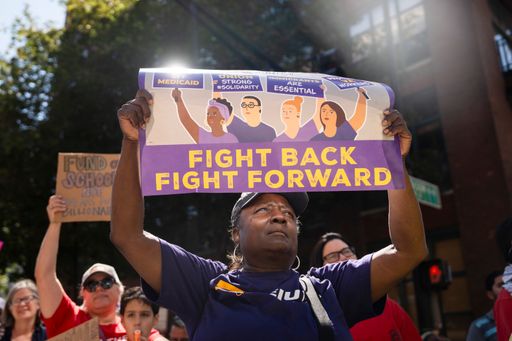Washington, DC — Chicago's power isn't just in its famous skyline or iconic streets.
From the soul-deep hum of its L train to the smell of roasted peanuts wafting from the corners, the city is often credited with threading the American heartland to the world.
Yet today, it finds itself caught up in a fierce debate about its security and future.
In a White House press conference on Tuesday, flanked by members of the cabinet, including Vice President JD Vance, US President Donald Trump reiterated, "We're going to send National Guard to Chicago."
He repeated that ultimatum on Wednesday.
Trump, who has called Chicago "the worst and most dangerous city in the world," warned that he will deploy troops to the crime-ridden "hellhole," though he would not say when he planned to launch the clampdown.
The latest move by the US President is part of a sweeping blitz on crime and immigration in mostly Democratic-led cities, a hardline drive that has drawn sharp backlash from many.
Some view the decision as overdue.
Vincent Brown, born and raised in North Lawndale, located on the West Side of Chicago, told TRT World over phone that although he feels safe in the city, the presence of the National Guard might be beneficial.
"I have witnessed its (Chicago's) development, its transition, but I don't dismiss violence altogether, there's always corners of violence."
He added, "Without order, there's chaos. And I know that… he's (Trump is) going to bring a change… beneficial for everyone."
A terrible precedent
But Sheila Avery, also from North Lawndale, remembers 1968. She was eight years old when the Guard rolled in for riots. Forget safety, she says; she was glued inside her house, afraid to breathe, much less cross her doorstep.
"They were stationed right in front of my home… we were just so afraid," she told TRT World. That terror didn't vanish decades ago; it's buried in memory.
1968 Chicago riots erupted after Martin Luther King Jr.'s assassination, resulting in looting and violence in which the city saw 10,500 police joined by 6,700 National Guard troops, with 5,000 more soldiers sent in by President Johnson.
In an interview with TRT World, former US Secretary of the Army Louis Caldera reflected on America's long tradition of the military safeguarding national security, while emphasising that states retain their own rights.
"We have never had national police, and the military should not be serving as national police….our laws say that it should be local police, part of the community, and certainly not federal troops who enforce law. This sets a terrible precedent," Caldera said.
It is a sentiment shared by many. Willie Cossom, from Pullman, Chicago, is not knee-jerk against a uniform, but he wants investment, not patrols.
"More engagement with the city's youth," says the Chicago resident. "That would drive down crime."
Troops could help, he admitted in a phone interview from Chicago, in some cases, "but for the most part, it wouldn’t really help."
As Trump's deadline looms, the city is pulsing. Local leaders are already girding for legal fights, protests, and executive orders signaling "defiance in the face of overreach."

'We're coming!'
Although violent crime is overall down (homicides 30 percent, shootings nearly 40 percent) in 2025 over last year, occasional flare-ups occur.
Seven people lost their lives in Chicago over the Labor Day weekend, NBC Chicago reported, even as the mayor pledged to resist Trump's bid to crack down on crime.
Local police said in a statement that the incidents were largely unrelated and suspects were in custody, but the latest fatality figures are likely to add weight to Trump's push to send troops into the city.
Trump has turned up the heat since August, repeatedly calling Chicago "a mess" and pinning the blame on what he described as failed Democratic leadership.
"You have an incompetent mayor. Grossly incompetent," he told reporters recently. "And we’ll straighten that one out probably next. That’ll be our next one after this. And it won’t even be tough."
Trump sent a warning to Illinois Governor JB Pritzker in a post on his social media platform. Pritzker "better straighten it out, FAST, or we're coming!” Trump declared.
Pritzker responded by saying that the president's plan was "unprecedented and unwarranted. It is illegal, it is unconstitutional, it is un-American."
'Do not come to Chicago'
The city itself appears to be split.
On the South and West Sides, where violence is frequent, some residents say extra boots on the ground could bring relief.
Others worry that a show of force will make matters worse, especially around immigrant communities who are already feeling under siege.
"I've lived in Bronzeville my whole life," says Keisha Thompson, a local nurse.
"Bringing in the National Guard ain't gonna make us safer. They don't know the neighbourhoods, don’t know the people. It’ll just make folks scared to go outside and trust nobody."
Chicago Mayor Brandon Johnson has meanwhile gone ahead and signed an executive order dubbed the "Protecting Chicago Initiative," which he described in a news conference as "the most sweeping campaign of any city in the country to protect ourselves from the threats and actions of this out-of-control administration" and which "directs our department of law to pursue any and every legal mechanism to hold this administration accountable for violating the rights of Chicagoans."
"Do not come to Chicago, you are neither wanted here nor needed here," Governor Pritzker recently warned.
The Trump administration, meanwhile, is in no mood to relent.
Karoline Leavitt, Assistant to the President and the White House Press Secretary, signalled on Tuesday that Trump is right about Chicago's crime crisis, attempting to compare the murder rate there with that of South Asian cities such as New Delhi and Islamabad.
"JB Pritzker should do something radical! He should pick up the phone and call the president because the 'nothing to see here' move isn't working".
The Chicago standoff, it appears, is on, and the famed city is steeling itself for impact.


















